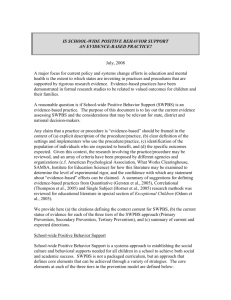Schoolwide Positive Behavior Supports Resources
advertisement
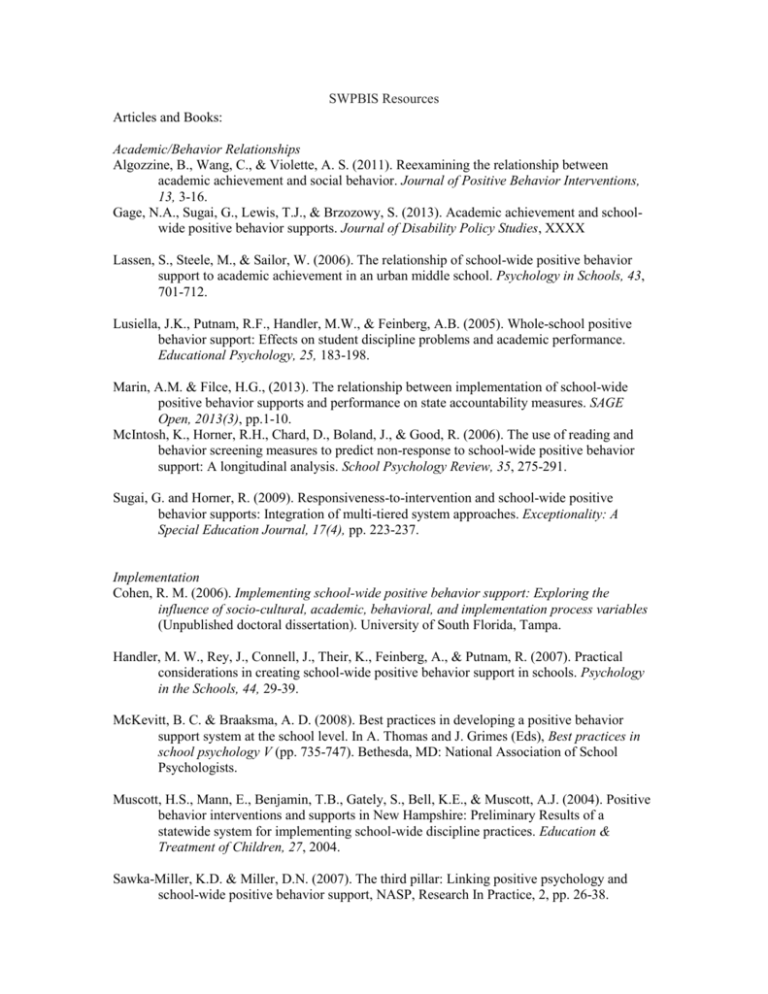
SWPBIS Resources Articles and Books: Academic/Behavior Relationships Algozzine, B., Wang, C., & Violette, A. S. (2011). Reexamining the relationship between academic achievement and social behavior. Journal of Positive Behavior Interventions, 13, 3-16. Gage, N.A., Sugai, G., Lewis, T.J., & Brzozowy, S. (2013). Academic achievement and schoolwide positive behavior supports. Journal of Disability Policy Studies, XXXX Lassen, S., Steele, M., & Sailor, W. (2006). The relationship of school-wide positive behavior support to academic achievement in an urban middle school. Psychology in Schools, 43, 701-712. Lusiella, J.K., Putnam, R.F., Handler, M.W., & Feinberg, A.B. (2005). Whole-school positive behavior support: Effects on student discipline problems and academic performance. Educational Psychology, 25, 183-198. Marin, A.M. & Filce, H.G., (2013). The relationship between implementation of school-wide positive behavior supports and performance on state accountability measures. SAGE Open, 2013(3), pp.1-10. McIntosh, K., Horner, R.H., Chard, D., Boland, J., & Good, R. (2006). The use of reading and behavior screening measures to predict non-response to school-wide positive behavior support: A longitudinal analysis. School Psychology Review, 35, 275-291. Sugai, G. and Horner, R. (2009). Responsiveness-to-intervention and school-wide positive behavior supports: Integration of multi-tiered system approaches. Exceptionality: A Special Education Journal, 17(4), pp. 223-237. Implementation Cohen, R. M. (2006). Implementing school-wide positive behavior support: Exploring the influence of socio-cultural, academic, behavioral, and implementation process variables (Unpublished doctoral dissertation). University of South Florida, Tampa. Handler, M. W., Rey, J., Connell, J., Their, K., Feinberg, A., & Putnam, R. (2007). Practical considerations in creating school-wide positive behavior support in schools. Psychology in the Schools, 44, 29-39. McKevitt, B. C. & Braaksma, A. D. (2008). Best practices in developing a positive behavior support system at the school level. In A. Thomas and J. Grimes (Eds), Best practices in school psychology V (pp. 735-747). Bethesda, MD: National Association of School Psychologists. Muscott, H.S., Mann, E., Benjamin, T.B., Gately, S., Bell, K.E., & Muscott, A.J. (2004). Positive behavior interventions and supports in New Hampshire: Preliminary Results of a statewide system for implementing school-wide discipline practices. Education & Treatment of Children, 27, 2004. Sawka-Miller, K.D. & Miller, D.N. (2007). The third pillar: Linking positive psychology and school-wide positive behavior support, NASP, Research In Practice, 2, pp. 26-38. Walker, H.M., Horner, R.H., Sugai, G., Bullis, M., Sprague, J.R., Bricker, D., & Kaufman, M.J. (1996). Integrated approaches to preventing antisocial behavior patterns among schoolage children and youth, Journal of Emotional and Behavioral Disorders, 4(4), pp. 194209. Facilitators & Barriers in Implementation Bambara, L., Nonnemacher, S., & Kern, L. (2009). Sustaining school-based individualized positive behavior support: Perceived barriers and enablers. Journal of Positive Behavior Interventions 11, 161-176. Feuerborn, L. & Chinn, D. (2012). Teacher perceptions of student needs: Implications for positive behavior supports. Behavior Disorders, 37, 219-231. Kincaid, D., Childs, K., Blasé, K. & Wallace, F. (2007). Indentifying barriers and facilitators in implementing school-wide positive behavior support. Journal of Positive Behavior Interventions, 9, 174-184. Lohrmann, S., Forman, S., Martin, S., & Palmieri, M. (2008). Understanding school personnel’s resistance to adopting school-wide positive behavior support at a universal level of intervention. Journal of Positive Behavior Interventions, 10(4), 256-269. McIntosh, K., Predy, L. K., Upreti, G., Hume, A. E., Turri, M. G., & Mathews, S. (2014). Perceptions of contextual features related to implementation and sustainability of schoolwide positive behavior support. Journal of Positive Behavior Interventions, 16, 29-41. Richter, M, Lewis, T., & Hagar, J. (2011). The relationship between principal leadership skills and school-wide positive behavior support: An exploratory study. Journal of Positive Behavior Interventions, 14, 69-77. Elementary Schools Bradshaw, C., Reinke, W., Brown, L. Bevans, K., & Leaf, P. (2008). Implementation of schoolwide positive behavioral interventions and supports (PBIS) in elementary schools: Observations from a randomized trial. Education & Treatment of Children, 31, 1-26. Horner, R.H., Sugai, G., Smolkowski, K., Eber, L., Nakasato, J., Todd, A.W., & Esperanza, J. (2009). A randomized, wait-list controlled effectiveness trial assessing school-wide positive behavior support in elementary schools. Journal of Positive Behavior Interventions, 11, 133-144. Secondary Schools Bohanon, H., Fenning, P., Carney, K., Minnis, M., Anderson-Harriss, S., Moroz, K., . . . Piggott, T. (2006). School-wide application of positive behavior support in an urban high school: A case study. Journal of Positive Behavior Interventions, 8, 131-145. Flannery, K.B., Frank., J. L., Kato, M.M., Doren, B., & Fenning, B. (2013). Implementing Schoolwide Positive Behavior Support in High School Settings: Analysis of Eight High Schools. The High School Journal, 96 (4), 267-282. Flannery, B. K., Sugai, G., & Anderson, C.M. (2009). School-wide positive behavior support in high school: Early lessons learned. Journal of Positive Behavior Interventions, 11, 177185. Young, E., Caldarella, P., Richardson, M, & Young, K. (2012). Positive Behavior Support in Secondary Schools: A Practical Guide. New York: The Guilford Press. Sustainability Coffey, J., & Horner, R. H. (2012). The sustainability of schoolwide positive behavioral interventions and supports. Exceptional Children, 78, 407–422. Mathews, S., McIntosh, K., Frank, J.L. & May, S.L. (2013). Critical features predicting sustained implementation of school-wide positive behavioral interventions and supports. Journal of Positive Behavior Interventions, XXXXXX Sugai, G. & Horner, R. (2006). A promising approach for expanding and sustaining school-wide positive behavior support. School Psychology Review, 35(2), pp.245-259. Websites: OSEP Technical Assistance Center https://www.pbis.org/ Illinois PBIS Network http://www.pbisillinois.org/ New Hampshire Center for Effective Behavioral Interventions http://www.nhcebis.seresc.net/ Wisconsin Department of Public Instruction http://rti.dpi.wi.gov/rti_pbis Systemic Change Resources Articles and Books: Adelman, H. S., & Taylor, L. (2001). Organization facilitators: A change agent for systemic school and community changes. Los Angeles, CA: Center for Mental Health in Schools. Adelman, H. S., & Taylor, L. (2007). Systemic change for school improvement. Journal of Educational and Psychological Consultation, 17, 55–77. Curtis, M.J., Castillo, J.M., & Cohen, R.M. (2008). Best practices in systems-level change. In A. Thomas & J.P. Grimes (Eds.), Best practices in school psychology V (pp. 887-902). Bethesda, MD: National Association of School Psychologist. Fixen, D.L., Naoom, S.F., Blasé, K.A., Friedman, R.M., & Wallace, F. (2005). Implementation research: A synthesis of the literature (FMHI Publication No. 231). Tampa: University of South Florida, Louise de la Parte Florida Mental Health Institute, National Implementation Research Network. Fullan, M. (2001). The “new” meaning of educational change (3rd ed.). New York, NY: Teachers College Press. Gusky, T.R. (1988). Teacher efficacy, self-concept, and attitudes toward the implementation of instructional innovation. Teaching and Teacher Education, 4, 63-69. Hall, G.E., & Hord, S.M. (2011). Implementing change: Patterns, principles, and potholes. (3rd ed.). Boston, MA: Allyn & Bacon.
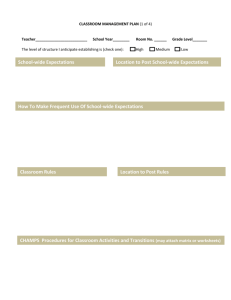

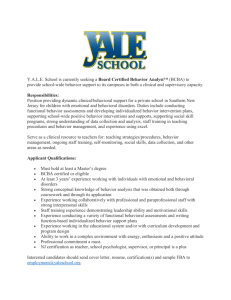
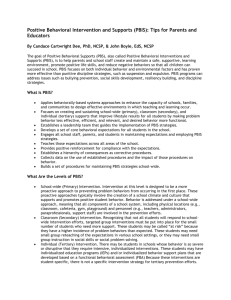
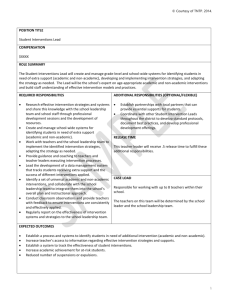
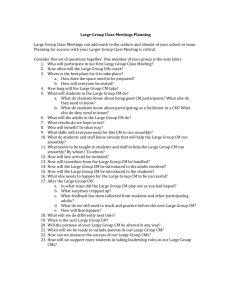
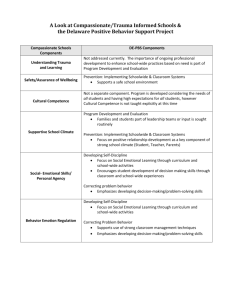
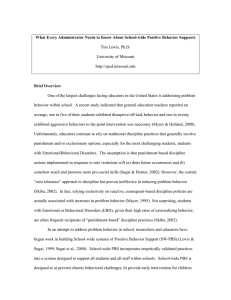
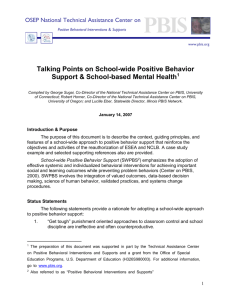
![What is PBIS 8 Aug 2014[1]](http://s3.studylib.net/store/data/007243362_1-1ba440942a2242972f1bbd1fd071909f-300x300.png)
